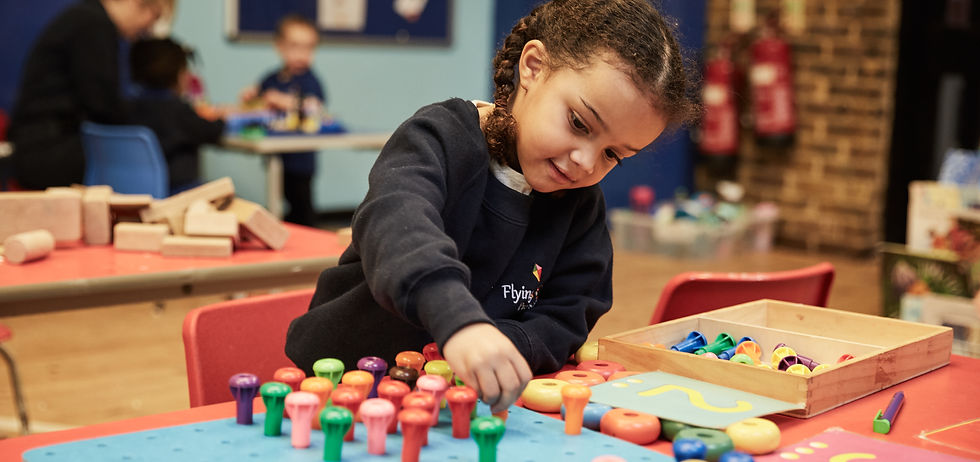The Early Years Foundation Stage (EYFS)
The EYFS sets standards for the learning, development and care of children from birth to 5 years old. All schools and Ofsted-registered early years providers must follow the EYFS, including childminders, preschools, nurseries and school reception classes.
The Early Years Foundation Stage (EYFS) framework supports an integrated approach to early learning and care. It gives all professionals a set of common principles and commitments to deliver quality early education and childcare experiences to all children. Please read about our personalised curriculum here.
There are four overarching principles in the Early Years Foundation Stage (EYFS). These are:
• A Unique Child
• Positive Relationships
• Enabling Environments
• Learning and Development
Every child is unique and individual and will make progress at different rates. In order to thrive, learn and develop, they need to have opportunities to create positive relationships with others and explore environments that stimulate their curiosity.
These principles underpin all aspects of teaching and learning in the Early Years Foundation Stage.
What is a ‘Unique Child’?
Every child is a unique child who is constantly learning and can be resilient, capable, confident and self-assured.
At Flying Start we:
-
Understand and observe each child’s development and learning, assess progress, plan for next steps.
-
Plan according to the interests and needs of the individual children.
-
Support children to develop a positive sense of their own identity and culture.
-
Identify any need for additional support.
-
Keep children safe.
-
Value and respect all children and families equally
Why are positive relationships important?
Children learn to be strong and independent through positive relationships.
Positive Relationships are:
-
warm and loving, and foster a sense of belonging;
-
sensitive and responsive to the child’s needs, feelings and interests;
-
supportive of the child’s own efforts and independence;
-
consistent in setting clear boundaries;
-
stimulating;
-
built on good relationship with the key person at Flying Start
Why are enabling environments important?
Children learn and develop well in enabling environments, in which their experiences respond to their individual needs and there is a strong partnership between practitioners and parents and carers.
At Flying Start we offer:
• value all people
• value learning
• stimulating resources, relevant to all the children’s cultures and communities;
• rich learning opportunities through play and playful teaching;
• support for children to take risks and explore.
How do we plan for your children?
On-going assessment is at the heart of effective early years practice. We,
• Observe children as they act and interact in their play, everyday activities and planned activities, and learn parents about what the child does at home.
• Consider the ‘Unique Child: observing what children can do’ to help identify where the child may be in their own developmental pathway.
• Consider ways to support each child to strengthen and deepen their current learning and development, reflecting on ‘Positive Relationships’ and ‘Enabling Environments’.
• Where appropriate, use the development statements to identify possible areas in which to challenge and extend the child’s current learning and development.
The statutory framework covers the education and care of all children in early years provision, including children with special educational needs and disabilities. Our experienced practitioners teach all children by ensuring challenging, playful opportunities across the Prime and Specific Areas of learning and development.
Prime Areas:
Personal, Social and Emotional Development,
Communication and Language,
Physical Development.
Specific Areas:
Literacy,
Mathematics,
Understanding the World,
Expressive Arts and Design.
The three Prime Areas are crucial at igniting children’s curiosity and enthusiasm for learning and for building their capacity to learn and form relationships.
All children are unique and individual and therefore learn in different ways. The characteristics of effective early learning advocate that in planning and guiding children’s activities, practitioners must reflect on the different ways that children learn, and then reflect these in their practice. A child’s individual learning characteristic will determine the way they respond to both the teaching and learning taking place in the environment. Three characteristics of effective teaching and learning identified by the EYFS are:
• Playing and exploring - children investigate and experience things, and ‘have a go’;
• Active learning - children concentrate and keep on trying if they encounter difficulties, and enjoy achievements; and
• Creating and thinking critically - children have and develop their own ideas, make links between ideas, and develop strategies for doing things.
Inspired by this, we focus on how children learn rather than what they learn. We recognise that during their earliest years, children form attitudes about learning that will last a lifetime. Children who receive the right sort of support and encouragement during these years will be creative and adventurous learners throughout their lives. At Flying Start, our supportive practitioners and the environment we provide, nurtures this, but without forgetting that children are individuals who bring their own needs and talents to the learning environment.
Sarah Maynard
07976041790
Address
Flying Start Preschool
1st Molesey Scout Hut
193 Walton Road
East Molesey, Surrey
KT8 2DY
